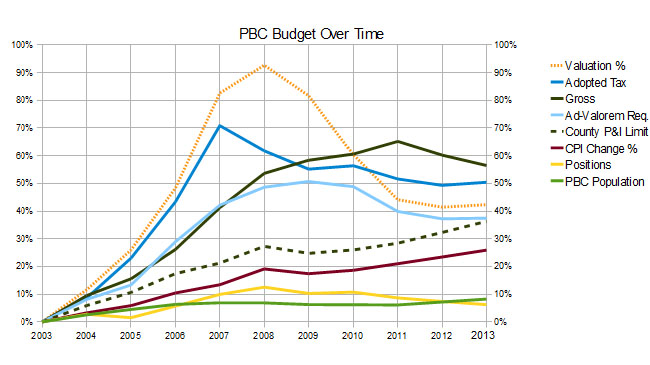
Final 2013 Budget Adopted
September 25, 2012
Last evening, at the final hearing on the 2013 county budget, a 4.7815 millage rate was adopted, unchanged from last year.
Compared to the contentious budgets of the last three years, where rates went up 14.9%, 9.3% and 0.7% respectively, this was a pleasant change. Missing was the Kubuki dance by the program constituents whose perogatives were threatened, the standoffs between the Administrator and the Sheriff, and battles with taxpayer advocates over the millage rate, the use of reserves, and the potential sale of county property to make ends meet. Some funds were even restored to address road maintenance that has been routinely deferred.
In a presentation by Bob Weisman at the last budget hearing earlier in the month, the trend in ad-valorem equivalent spending was shown to have converged on the “TABOR” line – that measurement of population growth and inflation that is a gauge of “acceptable” spending growth. What that means is that if spending had risen only as fast as inflation and the expanding population since 2003, the spending level would be what it is today. Of course the fact that spending was quite a bit above that line for most of the period indicates that in good times, restraint is hard to find.
Much of this spending restraint came at the expense of the county departments, as the “gorilla in the room” is the PBSO budget which at almost $480M has grown over 70% since 2003. With 83% of that figure tied to salary and benefits, expect much discussion of that figure going forward.
TAB has typically been critical of the budgets of recent years, but this year we are satisfied that flat millage without significant program cuts was appropriate. Going forward though, as housing recovers and valuations start up again (they bottomed this year), we will remain vigilant, and hope that the “TABOR” discipline has caught on. With Commissioner Santamaria already calling for raises for all employees, we shall see.
Here are the Post and Sun-Sentinel accounts of the meeting:
- Palm Beach County approves $3.2 billion budget, holding tax revenues steady
- Palm Beach County avoids property tax increase
In the following graph, the dotted line represents “TABOR” – indicating that population and inflation supported a 36% cumulative growth in spending. As you can see, ad-valorem spending has come down to that line, with valuations and adopted tax leveling off. The decline in gross spending seems to be influenced by a sharp dropoff in “intergovernmental” revenue – federal and state grants and the like. That category fell to $391M from $523M in 2012.
